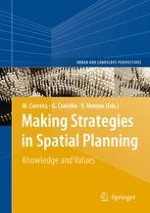2010 | OriginalPaper | Buchkapitel
21. Thinking Through Complex Values
verfasst von : Maria Cerreta
Erschienen in: Making Strategies in Spatial Planning
Verlag: Springer Netherlands
Aktivieren Sie unsere intelligente Suche, um passende Fachinhalte oder Patente zu finden.
Wählen Sie Textabschnitte aus um mit Künstlicher Intelligenz passenden Patente zu finden. powered by
Markieren Sie Textabschnitte, um KI-gestützt weitere passende Inhalte zu finden. powered by
